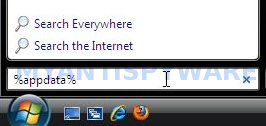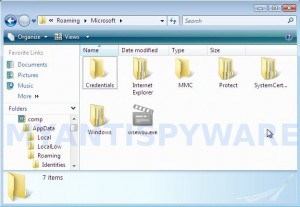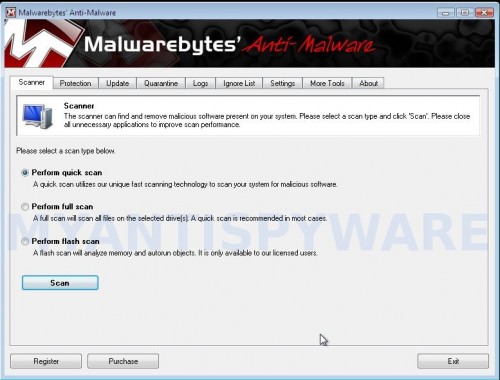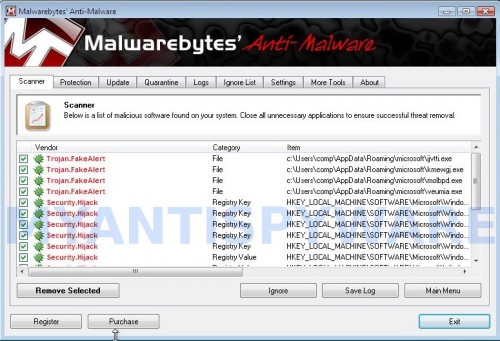Windows Protection Alarm is a new rogue anti-spyware program which pretends to be a reliable security software. It uses misleading tactics such false scan results, fake security alerts and browser hijacking in order to trick you into purchasing this program. Of course, you should not do that because this program is a scam. Simply ignore all that it will display you and just remove Windows Protection Alarm as soon as you notice it.
Like other rogues from same family, Windows Protection Alarm is distributed through the use of Microsoft Security Essentials Alert infection. This infection will display legitimate looking pop-ups similar to Microsoft Security Essentials alerts. It will state “Unknown Win32/Trojan was detected on your computer” and ask you to perform a scan of your computer. When the scan is complete, it will report that a particular file is infected with Trojan.Horse.Win32.PAV.64.a. and then prompt you to install Windows Protection Alarm to clean your computer. If you confirm by clicking to OK button, it will download and install the rogue and then reboot your computer.
When Windows is loaded, you will be surprised to see that Windows Protection Alarm screen appears before your normal Windows desktop. It will prompt you to perform a scan of your computer. During the scan, it will detect a lot of infections to trick you into thinking your PC is infected with all sorts of malicious software. It will report that was able to clean the majority of infected files, but was not able to cure a few important Windows files and offer to purchase a license of Windows Protection Alarm to clean them. Important to know that all of these infections are fake, the rogue is incapable of detecting and exterminating any computer infections. So you can safely ignore all that the malicious program will show you.
While Windows Salvage System is running, it will display tons of annoying alerts that state that your computer has been infected by a virus or some other suspicious activity.
Attention
Suspicious software activity is detected.
Please start system files scanning for details.
Warning!
Name: taskmgr.exe
Name: C:\WINDOWS\taskmgr.exe.
Viruses: Backdoor.Win32
Of course, all of these alerts and warnings are a fake. It is a part of scare tactics to make you think your computer is infected with all sorts of malicious software. Like false scan results you can safely ignore them.
From the above, obviously, Windows Protection Alarm is a scam, that created with one purpose to scare your into purchasing so-called “full” version of the program. Most importantly, do not purchase it! If you find that your computer is infected with this malware, then be quick and take effort to uninstall it immediately. Use the removal guide below to remove Windows Protection Alarm from your computer for free.
Automatic removal instructions for Windows Protection Alarm
1. Once Windows loaded you will see a Windows Protection Alarm screen. Click OK button to perform a fake scan. Once the scan is complete, press the “Fix Errors” button. Now you can close the program. Click “X” button at the top-right of Windows Protection Alarm. After that your Windows Desktop will be available.
2. Click Start, Type in search field (if you use Windows XP, then Click Start, Run and type in Open field): %APPDATA% as shown below.
3. Press Enter. It will open the contents of Application Data folder (for Windows XP) or the contents of Roaming folder (for Windows Vista, Windows 7). Next open the Microsoft folder as shown in the screen below.
4. Basically, there will be a file named with a series of numbers or letter (e.g. wsewsu.exe or wsewsu, look the example above), right click to it and select Rename (don`t rename any folders). Type any new name (123.exe) and press Enter. Reboot your computer.
5. Download MalwareBytes Anti-malware (MBAM). Once downloaded, close all programs and windows on your computer.
6. Double-click on the icon on your desktop named mbam-setup.exe. This will start the installation of MalwareBytes Anti-malware onto your computer. When the installation begins, keep following the prompts in order to continue with the installation process. Do not make any changes to default settings and when the program has finished installing, make sure a checkmark is placed next to “Update Malwarebytes’ Anti-Malware” and Launch “Malwarebytes’ Anti-Malware”. Then click Finish.
7. MalwareBytes Anti-malware will now automatically start and you will see a message stating that you should update the program before performing a scan. If an update is found, it will download and install the latest version.
8. As MalwareBytes Anti-malware will automatically update itself after the install, you can press the OK button to close that box and you will now be at the main menu. You will see window similar to the one below.
9. Make sure the “Perform quick scan” option is selected and then click on the Scan button to start scanning your computer for Windows Protection Alarm associated malware. This procedure can take some time, so please be patient.
10. When the scan is finished a message box will appear that it has completed scanning successfully. Click OK. Now click “Show Results”. You will see a list of infected items similar as shown below.
Note: list of infected items may be different than what is shown in the image below.
11. Make sure all entries have a checkmark at their far left and click “Remove Selected” button to remove Windows Protection Alarm infection. MalwareBytes Anti-malware will now remove all files and registry keys associated with Windows Protection Alarm and add them to the programs’ quarantine. When MalwareBytes Anti-malware has finished removing the infection, a log will open in Notepad and you may be prompted to Restart.
Windows Protection Alarm removal notes
Note 1: if you can not download, install, run or update Malwarebytes Anti-malware, then follow the steps: Malwarebytes won`t install, run or update – How to fix it.
Note 2: if you need help with the instructions, then post your questions in our Spyware Removal forum.
Note 3: your current antispyware and antivirus software let the infection through ? Then you may want to consider purchasing the FULL version of MalwareBytes Anti-malware to protect your computer in the future.
Windows Protection Alarm creates the following files and folders
%AppData%\Microsoft\{RANDOM}.exe
Windows Protection Alarm creates the following registry keys and values
HKEY_LOCAL_MACHINE\SOFTWARE\Microsoft\Windows NT\CurrentVersion\Image File Execution Options\avastsvc.exe
HKEY_LOCAL_MACHINE\SOFTWARE\Microsoft\Windows NT\CurrentVersion\Image File Execution Options\avastui.exe
HKEY_LOCAL_MACHINE\SOFTWARE\Microsoft\Windows NT\CurrentVersion\Image File Execution Options\msascui.exe
HKEY_LOCAL_MACHINE\SOFTWARE\Microsoft\Windows NT\CurrentVersion\Image File Execution Options\msmpeng.exe
HKEY_LOCAL_MACHINE\SOFTWARE\Microsoft\Windows NT\CurrentVersion\Image File Execution Options\msseces.exe
HKEY_LOCAL_MACHINE\SOFTWARE\Microsoft\Windows NT\CurrentVersion\Image File Execution Options\egui.exe | Debugger
HKEY_LOCAL_MACHINE\SOFTWARE\Microsoft\Windows NT\CurrentVersion\Image File Execution Options\ekrn.exe | Debugger
HKEY_CURRENT_USER\Software\Microsoft\Windows NT\CurrentVersion\Winlogon | Shell = “%AppData%\Microsoft\{random}.exe”
















